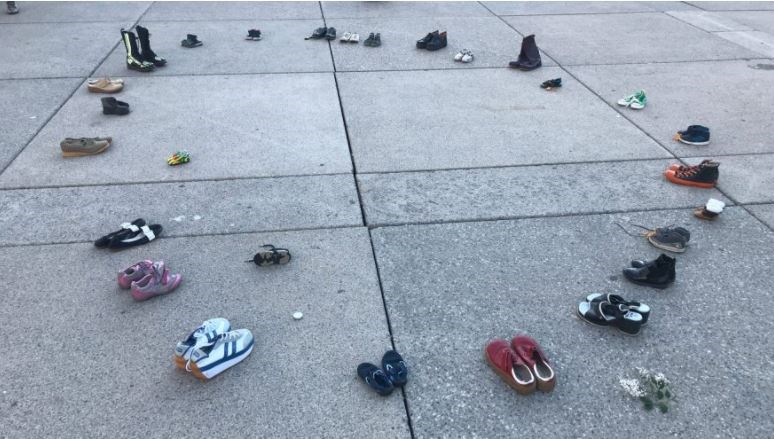A survivor-led process to recover the children lost at the sites of a former residential school and hospital in Sioux Lookout continues to move forward.
On Wednesday, Bikiiwewinig Nindawaashishiiminaanak signed a reaffirmation of relationship and a memorandum of understanding with with project partners, which included the Northern Nishnawbe Education Council and the Sioux Lookout First Nations Health Authority.
“In order for us to move on. In order for us to find ourselves. To bring ourselves home. To bring out children home. We have to look at all those protocols we’ve created. Look at the genocidal items, how they fit into those protocols, and how we can apply them to be the survivors. The living document,” said Ruby Morris, an elder, survivors and advisor for Bikiiwewinig Nindawaashishiiminaanak.
Lac Seul First Nation Chief Clifford Bull said the community is the lead of the initiative, which follows the discovery of unmarked graves at a former residential school site in Kamloops last year.
"We decided to do a search of a school that’s in our traditional territory in Treaty Three. A lot of our members from Lac Seul went there. My parents went there. My brothers went there as well. People from the North were sent to Pelican’s,” he said.
At the signing, Morris said that the graves discovered at the Kamloops residential site set her healing journey back decades.
“What happened to me there is I thought I was healed as a survivor, but I went back to square one again. I hadn’t finished healing. When I was asked to assist, I thought about it. I didn’t even know if I was the right person, and I thought I would give it a try,” Morris said.”
For the last 30 years, Morris has worked as a teacher who taught parenting, culture, and language.
“Those are the genocidal items. Those are the word that the government and the church attacked," she said. "That is the core of our human being as native people. They destroyed those.”
Last year, Lac Seul First Nation requested funding from the Crown-Indigenous Relations and Northern Affairs Canada (CIRNAC) to conduct research at Pelican Lake Residential School. Last November, the federal government gave Lac Seul $1 million. That amount was later raised to $6 million this April, which extends through 2024.
The additional funding provides Bikiiwewinig Nindawaashishiiminaanak with just over $550,000 to hire mental wellness human resource staff while the work is being done.
The province has provided $1.1 million, with $400,000 of that for mental health funding.
“The search is over three years, and right now we are having engagement sessions with the survivors. They’re the focus. They’re the lead. They tell us how the search should be conducted, when, and where. We are gathering their stories,” Bull said.
Survivor Genevie Kamenawatamin said the initiative is twofold.
"The first one is we talk about our childhood. What it was like at the residential schools. It was very traumatic for me. What happened to me at the school. At Pelican. It’s taking me a long time to become a relatively comfortable adult. It’s taken me years of counselling. I became a counsellor myself so I can help others," Kamenawatamin said.
"The other part is finding out about the children that died in the institutions here, and helping the families figure out what they want to do with their remains. Either taking the remains home for burial on their territories or we’ll bring the dirt down and cover them up with their own earth from their homelands.”
In addition to the Pelican Lake Residential School site, Bull acknowledges that the initiative will also be researching the Sioux Lookout Indian Hospital, a former federal hospital in Sioux Lookout, that serviced northern communities.
“A lot of children that got sick at Pelican obviously had to go to that hospital to get treatment,” Bull said.
Bull recounted some of the voices of First Nations parents who asked the hospital and the school about their children who entered the facility.
“We don’t know what happened,” said Bull. “So, we believe some of these children may have been buried and succumbed to their illnesses. It’s important that we try to find these children that are there.”
Bull said he expects the search will start in 2023.
